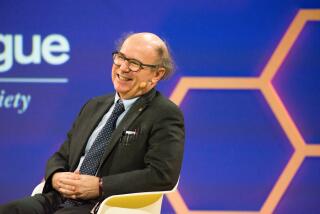A Case for Uniting Science, Religion
- Share via
Can religion and science ever get along? In “The Marriage of Sense and Soul,” Ken Wilber (Broadway Books, 1999), makes a case for it.
Wilber points out the problem in simple terms. Religion condemns science as a home for heretics. Science hurls back insults about God and faith. This has been going on for 300 years.
From the book’s first pages, Wilber keeps his eyes on the elite. We don’t read about the ordinary people who appear on the nightly news to tell us they need a heart transplant donor and they’re praying for a miracle. Or that they thank God their cell phone worked when they called for help from under an avalanche. It seems they have no problem mixing science and religion. Their testimonials play counterpoint to the war that Wilber chronicles. Soon it looks as if the leaders have lost touch with those they once led.
Holistic health guru Deepak Chopra and Vice President Al Gore endorse “Sense and Soul,” which gives us an idea of Wilber’s range as a philosopher. He has written more than a dozen books, offering solutions to the world’s essential problems using tools from East and West--scientific technology from one and spiritual technology from the other. In this book he adds references to the great Wisdom traditions of the world--Judaism and Hinduism, Buddhism and Christianity among them--to illustrate his points.
Integrating science and religion, he writes, requires that both sides accept their limits. Science can develop new technology but can’t always tell us what to do with it from a moral viewpoint. Religion can give meaning and instill values, but it comes up short on scientific proof.
Not everyone would agree with his diagnosis, but he recognizes that and asks that readers suspend their dogmatic beliefs long enough to consider his line of thinking. It is worth the cease-fire.
To give some idea of what integration might look like, Wilber recalls the time before the 17th century Age of Enlightenment and the scientific revolution when science was viewed as just one way of knowing about the world. Spiritual ways of knowing were equally valid. Modernity disregarded this view, but Wilber does not.
He isn’t out to discredit one side or the other. As often as he points to the limits of science, or religion, he names the important contributions both have made. The goal, he says, is to merge the progress advanced by modern science with the wisdom contained in classical religion.
He sees a better world coming, as a result. The enlightenment of the West offers political freedom, while the enlightenment of the East offers spiritual sophistication. Working together they could propel the liberation of people everywhere and form what Wilber calls the warp and woof of a culture that cares.
More to Read
Sign up for our Book Club newsletter
Get the latest news, events and more from the Los Angeles Times Book Club, and help us get L.A. reading and talking.
You may occasionally receive promotional content from the Los Angeles Times.





